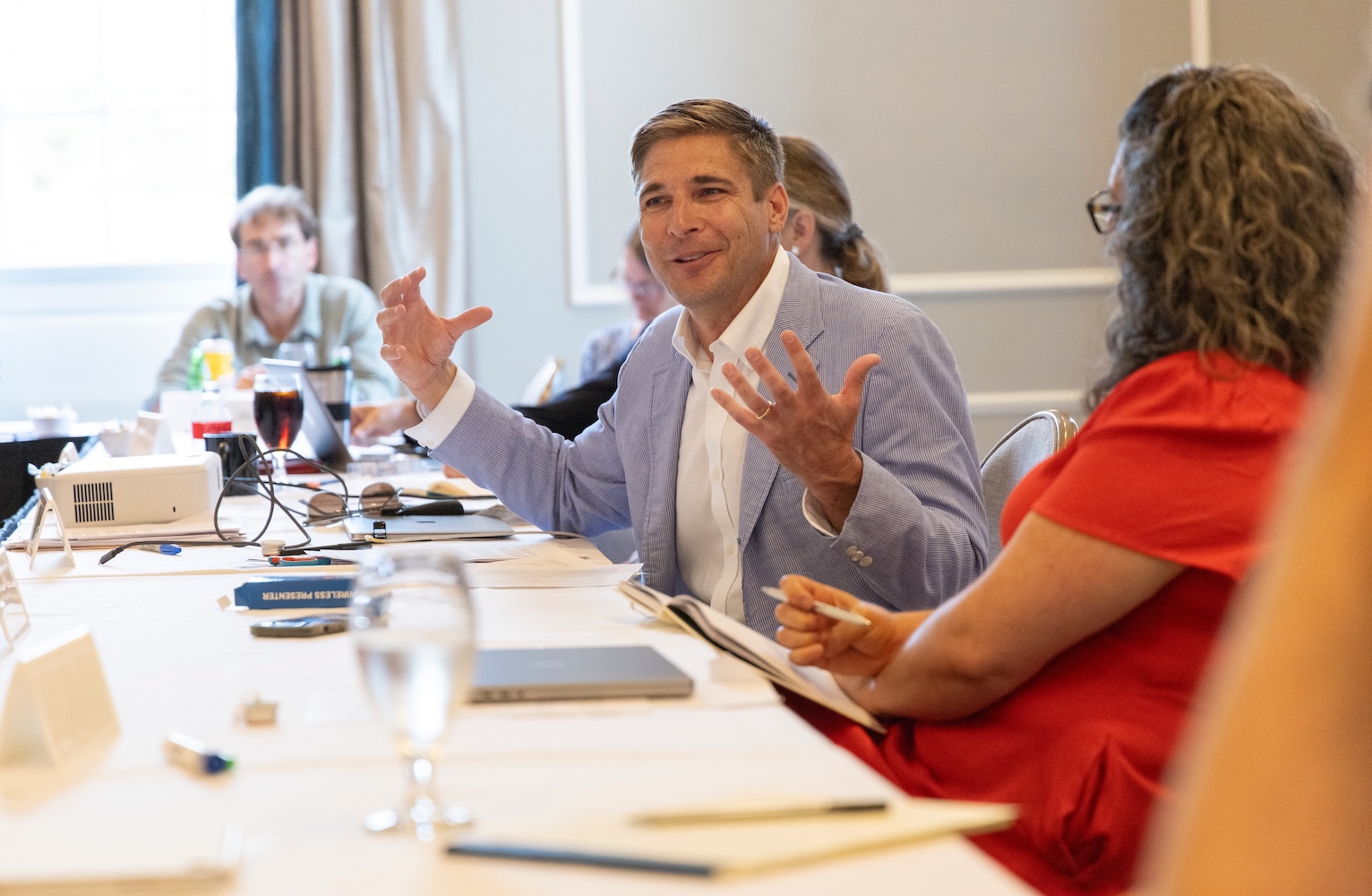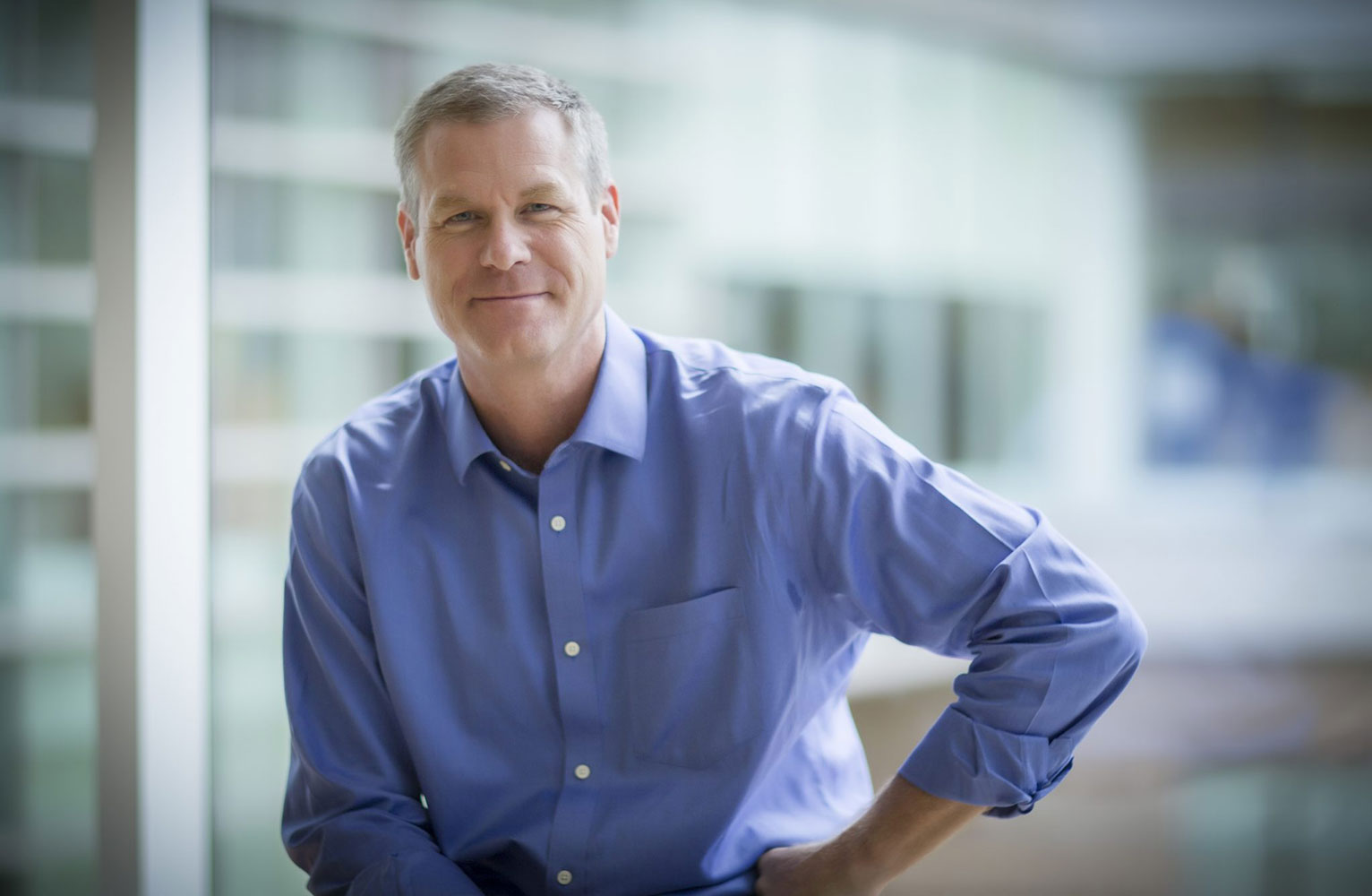
John Rose of the UNC School of Civic Life and Leadership leads a faculty seminar on civil discourse. (Photo by Jeyhoun Allebaugh)
SCiLL seminars help faculty lead classes that cover controversial topics.
Imagine a “typical” Carolina classroom, and you might picture students, mostly 18-22 years old, wearing hoodies or t-shirts with a UNC logo, listening to a professor who is several years their senior.
The UNC School of Civic Life and Leadership (SCiLL) is changing that typical scene this summer, turning college and university faculty from around the country into students as 40 professors visit campus to learn how to teach civil discourse in their own classrooms. The faculty seminars, with sessions in July and August, come as studies show increased ideological division among Americans, including deeply negative views of those on the “other side” of politics.
The series was organized by the Program for Public Discourse at SCiLL and the Polis: Center for Politics at Duke University’s Sanford School of Public Policy. SCiLL professor of the practice John Rose served as lead facilitator with Abdullah Antepli, professor of the practice and director of Polis at Duke, and Simon Greer of Courageous Conversations. It was supported with a grant from the Arthur Vining Davis Foundations.
“We want to help bring civil discourse to college classrooms across the country,” Rose said. “One of the many challenges with this is scale. By nature, civil discourse requires human interaction built on trust and familiarity. So the way to scale the effort is to teach faculty nationwide, and that’s what the seminar does.”
Antepli said that colleges and universities have an obligation to help students better understand the world’s most complicated challenges through discourse with others.
“There is no shortage of open-mindedness or of people who would like to understand opposing worldviews,” he said. “The problem is there are not many good spaces where this kind of engagement takes place, so we must create that space in higher education. If colleges and universities are not the place for ideas, disagreements and fruitful debates, then I don’t know where any of that can happen.”
The seminars offer course content and best practices to create open discussion of sensitive issues in the classroom. During one session, participants could be heard from down the hallway playfully shouting at each other as they acted out mock scenarios of classroom and campus debates. In another, Rose shared practical tips for leading courses that tackle controversial subjects.
Rose has led the summer seminars since 2022, when he was associate director of the Civil Discourse Project at Duke. The second session was added last summer, doubling the number of available seats to keep up with growing popularity.
“Many faculty are reluctant to engage in difficult classroom conversations because they look at their degrees and think, ‘This isn’t my specialization,’” Rose said. “But no matter what your discipline is, there are places the conversation can go in which a student might be afraid to say what they really think. It’s an opportunity to cultivate skills to have those conversations rather than avoid them.”
A Multiplier Effect
Participating faculty agree to teach at least one class at their home institution with a civil discourse component to it, meaning that there will be dozens of courses shaped by SCiLL training reaching hundreds, if not thousands, of students. Professors from a range of disciplines, including humanities, law and social sciences, are attending this summer’s sessions.
Leon Sachs, associate professor of French and Francophone Studies at the University of Kentucky, teaches a class on campus speech in UK’s Lewis Honors College. After attending the July session, he said he will incorporate exercises and ideas he learned during the seminar.
“UNC has emerged as a national leader in civil discourse, and they are generous about sharing their expertise,” Sachs said. “If we can’t help students feel comfortable having conversations, expressing their views and learning from criticism, then we aren’t doing our jobs as institutions of higher education in a liberal democracy. UNC, John Rose and their partners at Duke saw this, and the seminar is a great solution.”
Syon Bhanot, associate professor of economics at Swarthmore College, said he attended the July seminar because he teaches a public policy class where he invites speakers and includes readings to present a range of perspectives on controversial topics like abortion.
“It was great to find a community that wants to strengthen students’ ability to engage with people who aren’t like them, which really is most people,” Bhanot said. “At a place like Swarthmore, it’s fair to say most students and faculty are to the left. When you are in that kind of space, it is crucial to understand how to interact productively with those who disagree with you.”
Recommended reading for the seminars included works by academics, political leaders and historical figures aligned with both the ideological left and right (see full list below). One was an op-ed by Robert P. George of Princeton University and Cornel West of Union Theological Seminary titled, “To Save Themselves, Universities Must Cultivate Civic Friendship.”
So did professors, like their best students, go above and beyond to read the recommended materials?
“I did, and I even cancelled meetings to read them — they were excellent,” Bhanot said. “It will be helpful to assign some of them to my students to learn from higher authorities than myself in civil discourse.”
Story by University Development Office
Want to read what the professors are reading? Here’s the recommended list and complete syllabus for the summer 2025 faculty seminar series, “Teaching Civil Discourse in a Polarized Time.” Note that some linked sites require a subscription to view content.
Cornel West and Robert George, “To Save Themselves, Universities Must Cultivate Civic Friendship”
Martin Luther King, Jr., “Loving Your Enemies”
Derisa Grant, “On Difficult Conversations”
Amy Aldridge Sanford, “Confrontation and Avoidance: Alternatives to Civil Discourse”
Danielle Allen, “We’ve Lost Our Way on Campus”
Olúfemi O. Táíwò, “Being-in-the-Room Privilege: Elite Capture and Epistemic Deference”
John Rose, Civil Discourse Syllabus
Mohammad Fadel, “The Palestine Exception to Academic Freedom Must Go”
Erwin Chemerinsky, “College Officials Must Condemn On-Campus Support for Hamas Violence”
Maya Stahl, “The Campus-Protest Conundrum”
Frank Bruni, Ross Douthat, Lawrence H. Summers “‘Are We Past Peak Harvard?’: 3 Writers Mull Higher Education’s Woes”
Nissim Mizrachi & Erica Weiss, “We Do Not Want to Assimilate!”
Patrick Deneen, “Against Academic Freedom”
Related Stories




